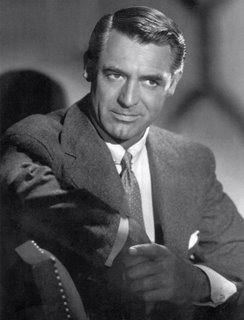
I would love to have tea with the Fox executive who, upon seeing Cary Grant’s initial screen test, informed the aspiring actor that he had no future in movies. Apparently suffering from a ‘thick neck’ and being ‘severely bow-legged’, Grant nevertheless did alright in films. Along the way he established an unparalleled approach to adroit sophistication that made his inimitable brand of masculinity the envy of both men and women. Even today the simple mention of his name conjures to mind sprite elegance, witty poise, good humor and abounding charisma. Not bad for a poor cockney who began his professional career as a Vaudevillian acrobat named Archibald Leach.
Yet the life of Cary Grant is a mass of contradictions. By charging twenty-five cents for autographs he developed a reputation for being a tight wad, yet his financial generosity to those in need remains unquestionable. A reoccurring living arrangement with fellow actor Randolph Scott generated allegations of homosexuality, even as Grant was noted for being a notorious womanizer, and, was married no less than five times. His first marriage to Woolworth heiress Barbara Hutton landed him the unflattering moniker of a sponge; “Cash and Carey” though he was already a successful actor at that point in his career. It was Grant himself who best summed up this tumult with, “I spent the greater part of my life fluctuating between Archie Leach and Cary Grant; unsure of either, suspecting both.”
Yet the complexities of Grant’s private world are strangely absent from his on-screen repertoire. Instead he has remained a constant almost galvanic creation of his own accord, exuding the worldly urbanity of a playboy second only to James Bond, behind which the trappings of his modest youth are only cautiously visible. When one thinks of Cary Grant then, the line between the man and the legend, the public and the private individual is strangely absent. Somewhere along the road to superstardom Grant lost the ability to differentiate for himself just who he really was, as he once mused, “If I couldn’t see out, how could anyone see in?”
And therein lays the everlasting appeal and allure of Cary Grant. He is ever more the icon than the man, a brand name tattooed onto flesh and blood for which no text book exists and no comprehensive study seems possible. Cary once said, “Everybody wants to be Cary Grant. Even I want to be Cary Grant.” Yet his unerring flawlessness as the debonair man about town, coupled with his undeniably handsome good looks make such a revelation impossible. In the final analysis, the words of sympathy that director, Billy Wilder telegrammed upon Grant’s death seem to most completely summarize the actor’s enduring legacy and mystique, “The model is gone. Who can we emulate now?” Who, indeed?
@Nick Zegarac 2006 (All rights reserved).
No comments:
Post a Comment